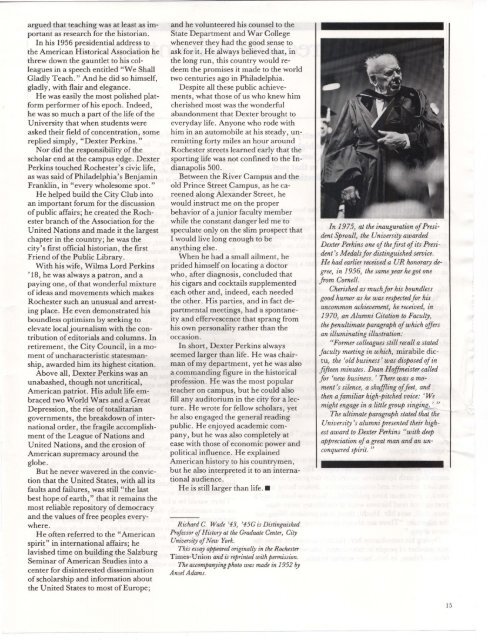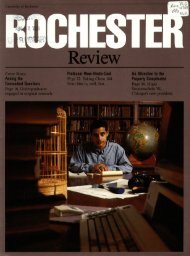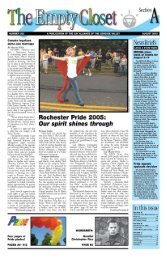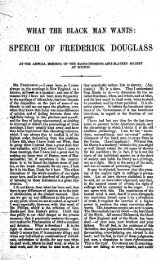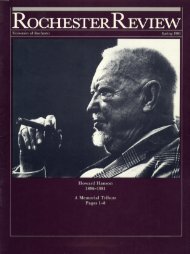Download PDF - University of Rochester Libraries
Download PDF - University of Rochester Libraries
Download PDF - University of Rochester Libraries
You also want an ePaper? Increase the reach of your titles
YUMPU automatically turns print PDFs into web optimized ePapers that Google loves.
argued that teaching was at least as important<br />
as research for the historian.<br />
In his 1956 presidential address to<br />
the American Historical Association he<br />
threw down the gauntlet to his colleagues<br />
in a speech entitled "We Shall<br />
Gladly Teach." And he did so himself,<br />
gladly, with flair and elegance.<br />
He was easily the most polished platform<br />
performer <strong>of</strong> his epoch. Indeed,<br />
he was so much a part <strong>of</strong> the life <strong>of</strong> the<br />
<strong>University</strong> that when students were<br />
asked their field <strong>of</strong> concentration, some<br />
replied simply, "Dexter Perkins."<br />
N or did the responsibility <strong>of</strong> the<br />
scholar end at the campus edge. Dexter<br />
Perkins touched <strong>Rochester</strong>'s civic life,<br />
as was said <strong>of</strong> Philadelphia's Benjamin<br />
Franklin, in "every wholesome spot."<br />
He helped build the City Club into<br />
an important forum for the discussion<br />
<strong>of</strong> public affairs; he created the <strong>Rochester</strong><br />
branch <strong>of</strong> the Association for the<br />
United Nations and made it the largest<br />
chapter in the country; he was the<br />
city's first <strong>of</strong>ficial historian, the first<br />
Friend <strong>of</strong> the Public Library.<br />
With his wife, Wilma Lord Perkins<br />
'18, he was always a patron, and a<br />
paying one, <strong>of</strong> that wonderful mixture<br />
<strong>of</strong> ideas and movements which makes<br />
<strong>Rochester</strong> such an unusual and arresting<br />
place. He even demonstrated his<br />
boundless optimism by seeking to<br />
elevate local journalism with the contribution<br />
<strong>of</strong> editorials and columns. In<br />
retirement, the City Council, in a moment<br />
<strong>of</strong> uncharacteristic statesmanship,<br />
awarded him its highest citation.<br />
Above all, Dexter Perkins was an<br />
unabashed, though not uncritical,<br />
American patriot. His adult life embraced<br />
two World Wars and a Great<br />
Depression, the rise <strong>of</strong> totalitarian<br />
governments, the breakdown <strong>of</strong> international<br />
order, the fragile accomplishment<br />
<strong>of</strong> the League <strong>of</strong> Nations and<br />
United Nations, and the erosion <strong>of</strong><br />
American supremacy around the<br />
globe.<br />
But he never wavered in the conviction<br />
that the United States, with all its<br />
faults and failures, was still "the last<br />
best hope <strong>of</strong> earth," that it remains the<br />
most reliable repository <strong>of</strong> democracy<br />
and the values <strong>of</strong> free peoples everywhere.<br />
He <strong>of</strong>ten referred to the" American<br />
spirit" in international affairs; he<br />
lavished time on building the Salzburg<br />
Seminar <strong>of</strong> American Studies into a<br />
center for disinterested dissemination<br />
<strong>of</strong> scholarship and information about<br />
the United States to most <strong>of</strong> Europe;<br />
and he volunteered his counsel to the<br />
State Department and War College<br />
whenever they had the good sense to<br />
ask for it. He always believed that, in<br />
the long run, this country would redeem<br />
the promises it made to the world<br />
two centuries ago in Philadelphia.<br />
Despite all these public achievements,<br />
what those <strong>of</strong> us who knew him<br />
cherished most was the wonderful<br />
abandonment that Dexter brought to<br />
everyday life. Anyone who rode with<br />
him in an automobile at his steady, unremitting<br />
forty miles an hour around<br />
<strong>Rochester</strong> streets learned early that the<br />
sporting life was not confined to the Indianapolis<br />
500.<br />
Between the River Campus and the<br />
old Prince Street Campus, as he careened<br />
along Alexander Street, he<br />
would instruct me on the proper<br />
behavior <strong>of</strong> a junior faculty member<br />
while the constant danger led me to<br />
speculate only on the slim prospect that<br />
I would live long enough to be<br />
anything else.<br />
When he had a small ailment, he<br />
prided himself on locating a doctor<br />
who, after diagnosis, concluded that<br />
his cigars and cocktails supplemented<br />
each other and, indeed, each needed<br />
the other. His parties, and in fact departmental<br />
meetings, had a spontaneity<br />
and effervescence that sprang from<br />
his own personality rather than the<br />
occasion.<br />
In short, Dexter Perkins always<br />
seemed larger than life. He was chairman<br />
<strong>of</strong> my department, yet he was also<br />
a commanding figure in the historical<br />
pr<strong>of</strong>ession. He was the most popular<br />
teacher on campus, but he could also<br />
fill any auditorium in the city for a lecture.<br />
He wrote for fellow scholars, yet<br />
he also engaged the general reading<br />
public. He enjoyed academic company,<br />
but he was also completely at<br />
ease with those <strong>of</strong> economic power and<br />
political influence. He explained<br />
American history to his countrymen,<br />
but he also interpreted it to an international<br />
audience.<br />
He is still larger than life .•<br />
Richard C. Wade '43, '45G is Distinguished<br />
Pr<strong>of</strong>essor <strong>of</strong> History at the Graduate Center, City<br />
<strong>University</strong> <strong>of</strong> New York.<br />
This essay appeared originally in the <strong>Rochester</strong><br />
Times-Union and is reprinted with permission.<br />
The accompanying photo was made in 1952 by<br />
Ansel Adams.<br />
In 1975, at the inauguration <strong>of</strong> President<br />
Sproull, the <strong>University</strong> awarded<br />
Dexter Perkins one <strong>of</strong> the first <strong>of</strong> its President<br />
's Medals for distinguished service.<br />
He had earlier received a UR honorary degree,<br />
in 1956, the same year he got one<br />
from Cornell.<br />
Cherished as much for his boundless<br />
good humor as he was respected for his<br />
uncommon achievement, he received, in<br />
1970, an Alumni Citation to Faculty,<br />
the penultimate paragraph <strong>of</strong> which <strong>of</strong>fers<br />
an illuminating illustration:<br />
"Former colleagues still recall a stated<br />
faculty meeting in which, mirabile dictu,<br />
the {old business' was disposed <strong>of</strong> in<br />
fifteen minutes. Dean H<strong>of</strong>fmeister called<br />
for {new business. ' There was a moment's<br />
silence, a shuffling <strong>of</strong> feet, and<br />
then afamiliar high-pitched voice: {We<br />
might engage in a little group singing. ' "<br />
The ultimate paragraph stated that the<br />
<strong>University</strong>'s alumni presented their highest<br />
award to Dexter Perkins "with deep<br />
appreciation <strong>of</strong> a great man and an unconquered<br />
spirit. "<br />
15


